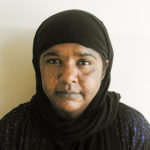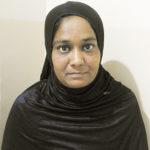March 8 is celebrated as International Women’s Day. This year, the theme for the Day is “Be Bold For Change.” You might wonder about the hype that sometimes surrounds this and other such days that are dedicated to particular causes. On Women’s Day, do we care to bring to our minds the millions of unsung, unseen, unheard women from economically-impoverished families who are making positive and bold changes, not just in their own lives, but also in the lives of many others? They are women of real substance, who have broken many barriers and have emerged strong and brave amidst enormous turmoil .
The other day, I had the privilege of meeting two such women, Mahboob Bi Munni and Sirajunissa, who live in a squalid slum, one of Bangalore’s most economically-impoverished areas. Listening to their stories on a sunny afternoon, I found abundant positivity, courage, compassion and care”a perfect source of inspiration for all women.
By Nigar
A Sunny Afternoon With Two Brave Women
March 8 is celebrated as International Women’s Day. This year, the theme for the Day is “Be Bold For Change.” You might wonder about the hype that sometimes surrounds this and other such days that are dedicated to particular causes. On Women’s Day, do we care to bring to our minds the millions of unsung, unseen, unheard women from economically-impoverished families who are making positive and bold changes, not just in their own lives, but also in the lives of many others? They are women of real substance, who have broken many barriers and have emerged strong and brave amidst enormous turmoil .
The other day, I had the privilege of meeting two such women, Mahboob Bi Munni and Sirajunissa, who live in a squalid slum, one of Bangalore’s most economically-impoverished areas. Listening to their stories on a sunny afternoon, I found abundant positivity, courage, compassion and care”a perfect source of inspiration for all women.
Munificent Munni!
Munni is a mother and a father figure to her children. Forgiving the terrible wrongs done to her by people in the past, she has emerged as a strong, independent woman, supporting her family emotionally and financially and reaching out to the poor and needy!
A smiling face that hides the many trials and tribulations she has been through, Mahboob Bi Munni is around 40 years old. Her father was a scrap- collector and worked hard to take care of the family. “My father was very protective about his daughters and was a kind, pious man. While my mother did all the housework, my father toiled hard for our bread and butter. We could afford to only send my two little brothers to a Kannada-medium school, but they had to drop out soon as the expense was too much for my father to bear,” Munni relates.
“My father had a great dream that all his daughters should be educated, but that never happened,” Munni continues. “Despite this, he sent me to a teacher close-by when I was 10 years old so that I could acquire some basic knowledge. I had to live with and learn from the teacher. But neither I nor my father knew what was in store for me there. I slowly learnt that I had to do all the housework of the teacher and her family and no subjects were taught to me. But I never told my father about this till one day, he found that I had been hurt on my nose. The teacher had hit me very hard. My father could take nothing more of this, and brought me back home.”
Hard work took a heavy a toll on Munni’s father, who took ill and passed away. Her little brothers dropped out of school to work as daily wage labourers. When she turned 20, Munni was married off.
It wasn’t a fairytale wedding for Munni. A few years later, her husband deserted her and their children”two boys and a girl”for another woman to whom he is married now.
Packing her bags with her three kids, she came to L. R Nagar, a slum area in Bangalore, and took a small bit of space on rent for herself and her kids.
“My Mama (mother’s brother) and his wife were the only one who knew what had happened with me and they gave me courage and said ‘Now you be the father and mother to your children. Lead an independent life,'” Munni relates, tears filling her eyes.
It was in L. R Nagar that Munni met Venkatraman Iyer (who is also called ‘Venkat’) of Swabhimaan, an NGO that works in and around the area. Swabhimaan’s initiative of regularly distributing nutritious food to over 500 poorest of the poor people in the area came as a boon to Munni. She joined the small team of volunteers. She earns Rs 5000 for her service, which includes helping out at the food distribution every day from Monday to Saturday, washing food carriers and doing heavy cooking work once a week. She also helps out at the Swabhimaan clinic in L R Nagar, from 3 pm to 5 pm, cleaning the place etc. Apart from this, Munni works as a domestic help in two houses.
Munni’s two sons have grown up (one is married), while her daughter is 12 years old and is in school. “I want my daughter to study and seek education as much as she wants. Women should work and earn their own living without depending on anybody. Of course, girls should do that sort of work that is acceptable in Islam, but to work is very important,” Munni says.
Today, with her earnings Munni supports her mother who lives with her, her sons and her daughter. She encourages her children to work hard. “My children never ask me for fancy things like a smart phone or such gadgets. They know the value of hard work,” she says.
Swabhimaan’s initiative of regularly distributing nutritious food to over 500 poorest of the poor people in the area came as a boon to Munni.
Sirajunissa’s Service For the Sick
Bringing up her two children as a single mother after the demise of her husband, Sirajunissa personifies courage against all odds. Her dedication to serve the needy has helped her become independent and strong.
You have to walk down the narrow, pot-holed lanes of the LR Nagar slum, lined with heaps of garbage (where dogs, cows, hens and crows, search for food) to arrive at a little, spic-and-clinic managed by Swabhimaan, where Sirajunissa works.
Sirajunissa, just over 4o, has seen some really tough moments. Her family’s poor economic condition (her father ran a cycle shop) did not let any of the children pursue higher education, and so she could study only till the seventh standard. “I got married at the age of 14 and came to Bangalore with my husband, who had set up his own unit to make steel pots,” she relates. “His business was doing well and he took good care of me. I didn’t have to step out anywhere to work and earn, but stayed at home and looked after our two children, a son and a daughter. It was all well for about 15 years. But then my husband developed a serious illness. I ran from pillar to post, from one hospital to another, for his treatment. His work suffered, and so did our income,” she recounts.
Sirajunissa and her husband lived in an area where Venkat’s NGO Swabhimaan works, and that is how she met him. Venkat employed her husband in the clinic managed by Swabhimaan. When her husband passed away, Swabhimaan offered to appoint her as assistant at the clinic, where she has been working for the last seven years.
As a single mother, Sirajunissa took up the responsibility of bringing up her two children. She taught them the values of hard work, which paid off well. Her son now works in a well-known pharmacy in the city. Both her children are now married. Sirajunissa encourages her daughter-in-law to work as that will instill confidence in her.
Sirajunissa considers her work at the Swabhimaan clinics as a service to the poor and needy. Assisting the doctors in the clinic, she has learned many technical skills and knows about different types of medicines for different ailments. Earning about Rs 6000 a month, Sirajunissa understands the value of hard work. “I saw my husband suffering so much during his illness, and I went through harrowing times in hospitals for his treatment, so I understand the pain of not having enough funds for medical treatment,” she says.
“I want to tell all women that as women, they are bound to face many difficulties. But they should not succumb to the traumas and ruin their lives. They should be brave and courageous, work hard and earn their own living within the limits of the Islamic framework. Women may face many difficulties, but yet we must reach out to the poor and needy. That is something that gives my life a great sense of purpose now”, she says.
(To know more about Swabhimaan, please email Venkat: venkatraman.iyer1958@gmail.com Ph: 9945436757
www.swabhimaan.org/story.html)



COMMENTS